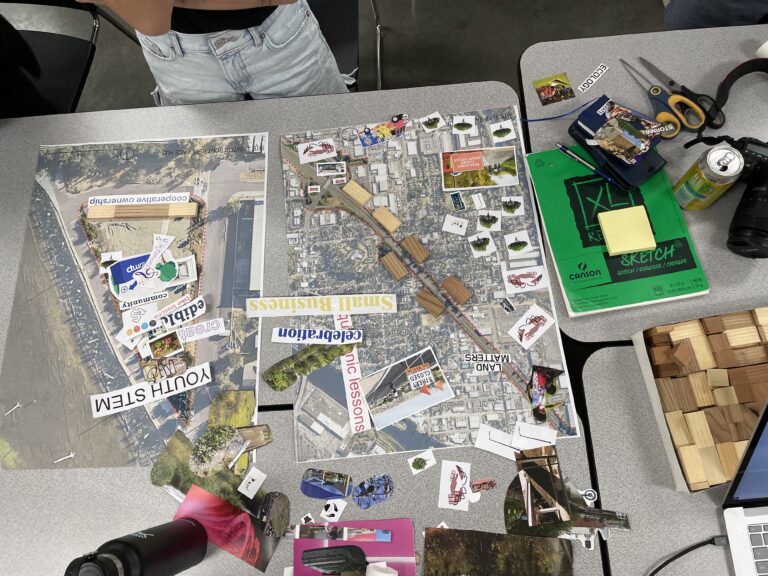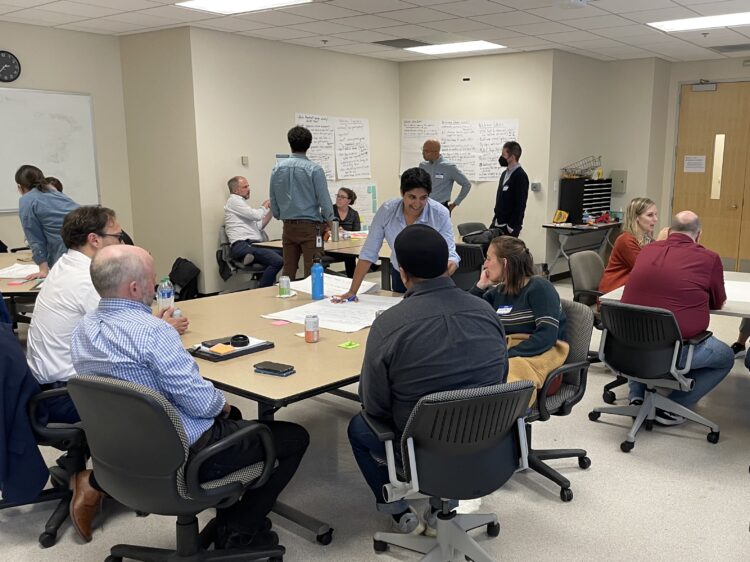Published on November 27, 2023

Co-creation sessions with Duwamish Valley community members and stakeholders that focused on identifying priorities, values, and aspirations for community open space in their neighborhoods. (Credit: Maron Bernardino)
After their launch in spring of this year, the two inaugural projects of the Research to Action Collaboratory have been making progress in key ways. Supported by Urban@UW, the two teams gathered together in May for an in-person, 3-day retreat where they had the opportunity to build project foundations, learn about and practice with salient tools and concepts for cross-boundary collaboration, and share with their peers. At the end of October, Urban@UW hosted the first ½-day RAC workshop for more learning, sharing and productivity. The cohort discussed how to understand and measure social impact, shared their current efforts and challenges, and buckled down in some team time. We learned that each team has been hard at work collaborating for regional ecosystem health.
The Collaborative on Extreme Heat Events held a planning and partnership-building workshop in early fall, gathering fifteen participants from Multnomah County in Oregon; King County; and Vancouver, British Columbia, and from the sectors of public health, emergency management, sustainability, and climate action planning. As initial members of the growing Collaborative, the group focused on building interjurisdictional networks. This includes a peer-sharing webinar series focused on experiences of the 2021 Heat Dome from different regions and sectors. They also had the opportunity to learn from the Duwamish River Community Coalition about successful community-led environmental initiatives, the importance of incorporating a community voice and representation in climate resilience projects, and the intersecting nature of environmental hazards experienced by residents of the Duwamish Valley. Next steps for this project include implementing the webinar series, as well as a larger participatory workshop focused on co-developing climate and health research and action agendas across the region.
The Just Circular Communities project has worked to solidify and grow their coalition of academic and community partners. During the summer months, a literature review was completed to support the development of background research, drawing from academic, community, and other resources, to establish a broad understanding of and expansion on key frameworks: Just Transition, Circular Economy, and Resilience/Regeneration. The team is building a broader definition of “circular economy” to encompass how different groups work together by supporting integrative relationships, coalition building, community wealth building, and community self-determination.

During September’s meeting in Seattle, meeting participants from Oregon, Washington, and Vancouver, BC, discussed future goal and activities for the Collaborative on Extreme Heat Events. (Credit: Daaniya Iyaz)
These frameworks will be presented as an introduction to workshops, and to support the development of a potential resource guide. In addition, the team is building a website as a public engagement platform for the work of the collaboration, including student work from the associated design studios. The next step for the project is to connect with more stakeholders, holding a series of inclusive and integrated workshops.
These projects are funded through September 2024, and we look forward to sharing their progress. The Research to Action Collaboratory will launch its second call for applications in late 2023 for projects that will extend through fall of 2025.